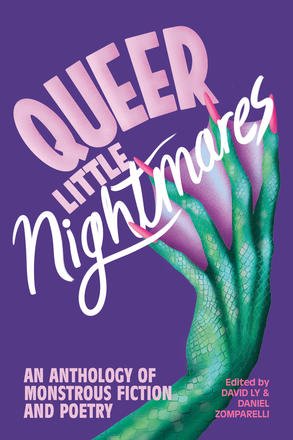Desirable Horrors and Absurd Monsters in ‘Queer Little Nightmares'
There’s a spectre that haunts the pages of the Queer Little Nightmares anthology, a pervasive pain that sinks in between lines and cuts with each paragraph break. It’s a hurt that manifests in myriad forms in the stories edited by Daniel Zomparelli and the poems edited by David Ly. The varied lines in this anthology are ultimately sutures trying to mend the many complexities of the horror of being queer.
Filled with poems and stories which explore the monstrosities of queer love, expression, and desire, the book encapsulates the various feelings around being othered. To be positioned within society as not the “norm” is already a pertinent experience among the queer community, but we see the addition of a categorical layer of monstrosity being added in Queer Little Nightmares. This collection speaks to and against these labels and experiences. The first handful of stories and poems embody this staple otherness with thematic werewolves, ghosts, and witches.
The anthology then flows from these more explicit comparisons of queerness to monstrosity (the werewolves, ghosts, and witches) to some less obvious notions around horror of being queer. For example, Hiromi Goto’s main character in “And the Moon Spun Round Like a Top” reminisces over how she was told that “even though she might not be gay, jeez was she ever queer.” Goto’s story perfectly encapsulates the subtlety and inconspicuousness of queer horror. The story in general deals with the terrors of menopause through the characterization of cute blood clot creatures, with only a couple of fleeting allusions to queer identity.
Other stories and poems tend to favour a level of absurdity to convey queer horror. The humour found in this absurdity replicates the “othered” experience to bring not only levity but also acts as a vessel to ridicule the ostracization of queer bodies. Pieces like these with their overtly modern references and language almost laugh at the absurdity of the monstrosity in queer fantasies and desires, eventually resulting in showcasing a brighter side to queer experiences.
This unconventional notion grows as the anthology progresses, but it is also weaved throughout. Opening lines like “My girlfriend has a belly like an unfilled bowl and teeth that I don’t get to file until we reach our six-month anniversary” from “Gruesome My Love” by Levi Cain immediately pull the reader into each new piece. Despite the variety in tone, there’s a thread that connects all these stories and poems. The more comedic pieces like this are slotted between harrowing topics of violent bigots in the vivacious gender exploration that is “Glamour-us” by Andrew Wilmot.
What the anthology captures, then, is this whirlwind of whimsy and wonder without detracting from any poignancy. Steven Cordova’s “An Invisible Man Is Humping a Vampire,” is a perfect example of this cutting quirk. The poem follows a couple (an invisible man and a vampire) who worry about passing the titular pair’s HIV-positive status to their offspring. Its initially raunchy lines like “fill me up with those babies” transform into poignant commentary on the isolation of AIDS when the two “are forced to admit/even their own offspring fears them.” The poem captures this tense battle between queer desire and ostracization, ultimately landing on an image of isolation.
In a similar vein, “Strange Case” by Eddy Boudel Tan explores the fervent buy-in that leads people to being catfished while also highlighting the desperation for connection within the queer community. The story captures the loneliness of a main character whose isolation is self-imposed as a result of his societal ostracization. This is an absurdity in itself, as the anthology collectively reminds us.
Put together, this anthology encapsulates many experiences of queerness, both of the damning and the liberating kind, to remind the reader that there is a vast community out there of people trying, too, to exist as a Monster in this ridiculous world. Such a journey is meant to be shared.
The many pieces in Queer Little Nightmares do not shy away from capturing experiences of queerness as they are, damning or liberating, to remind the reader that there is a vast community out there of people trying, too, to exist as an amalgamation of a monster in this absurd world. Such a journey is meant to be shared. Right to the end, Ly and Zomparelli’s sewn-together creation provokes myriad poignant emotions to provide comfort in, and for, the other.
Thank you to Arsenal Pulp Press for providing Shrapnel with a media copy of Queer Little Nightmares: An Anthology of Monstrous Fiction and Poetry , which is available now for purchase at Arsenal Pulp Press’s website and in bookstores across Canada.
Madeleine Chan
(they/she) writes on the unceded lands of the Musqueam, Squamish, and Tsleil-Waututh peoples (Vancouver, Canada) about media, culture, and/or identity in the pursuit of greater dialogue and understanding. They also attempt to spill poetry and prose from their guts from time to time. Find them on Twitter @madeleinechan and Instagram @madeleinelyc for more.



